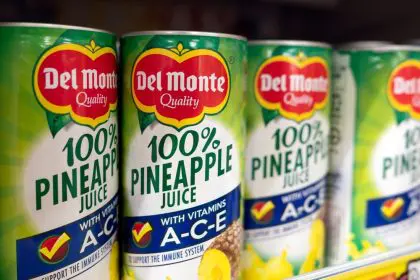
Words by Gavin Philip Godfrey Photos by Hiltron Bailey for Steed Media Service
Like a couple who’s been happily married for 50 years, Tyler Perry and Jill Scott love talking about the day they first met. As Scott tells it, they were complete strangers 15 years ago. Perry was a struggling playwright from Louisiana who had just moved to Atlanta, and Scott was a starving artist working at a French Connection store to make ends meet in her native Philadelphia. While in town on tour for one of his earlier plays, Perry stopped by the French Connection store looking for a shirt when he met the store’s manager, which just happened to be the lovely Miss Scott.
“He’s looking for a shirt and I’m showing him shirts and he doesn’t buy anything, but he’s got a nice sense of humor, he’s funny and a pleasure to talk to, so we talked,” Scott says, recounting their first meeting. Attempting to take their new relationship beyond the confines of the French Connection store, Perry presented his new friend with an open invitation. “He said: So, what are you doing later?’ And I said, ‘I don’t know.’ He said, ‘Why don’t you come and see a play?’ ”
Somewhat caught off guard by the offer, and the fact that Perry only gave her one ticket to ensure that she wouldn’t bring anybody, Scott agreed to attend. “I hadn’t done anything hardly, [I] just had a play in town,” Perry says of the initial awkwardness. “Nobody knew who I was.”
Yet, when this Philly girl had her first occasion to witness her new Southern friend’s creative genius, she was completely blown away. “So I went to this play and I don’t remember which one it was at the time but I do remember this,” she declares. “It wasn’t the okey-doke, it wasn’t the chitlin’ circuit. It was smart, it was funny, and it was thoughtful. I’m looking at the playbill and this guy… he’s the director and the writer!”
Pan forward to 2007 and both Scott and Perry are bona fide superstars in their own right. The girl who worked behind the register, making a part-time living in the world of retail, would take the music world by storm with her doubleplatinum debut disc, Who is Jill Scott? Words and Sounds Vol. 1. Scott received a Grammy nod for her classic love anthem, “A Long Walk,” and would go onto achieve gold success on her next two solo albums. Loved and adored by music fans across the globe, Scott has been praised for the raw emotion and real poetry she brings to her music and lyrics.
To go along with the $75 million he’s grossed in DVD and ticket sales from his eight plays, Perry is in the process of creating his own film empire. Along with his co-producer, Reuben Cannon, the wildly diverse Perry, also operates Tyler Perry Films. Perry released Diary of a Mad Black Woman, Madea’s Family Reunion, Daddy’s Little Girls and Why Did I Get Married? via the film company. Perry’s first three films cost a total of $17 million to make, and in turn the accomplished thespian-turnedbusiness aficionado has grown the initial investment into box office gross sales of $140.7 million.
click to view this photogallery
Like any great American tale, both Scott and Perry have rags-to-riches stories, worthy of any Hollywood screenplay, but it is their collaboration on the silver screen in Perry’s newest film that’s makes for a more intriguing script.
The screening for Why Did I Get Married? which was held in Atlanta, found Perry standing before a crowd of screaming sisters and inspired brothers joking about the dangers of movie bootlegging. “Hollywood doesn’t respect black or white, it’s all about the green. How did the movie do?” he says. “So when people bootleg the movie and sell it in the barbershops, it undercuts people who are trying to do the right thing.” Amongst the roar of applause and several ‘uh-huhs, yes sirs, and ain’t that the truths,’ Perry made another statement about his latest offering,“I will say this is my best movie.”
Like any artist paying respect to his craft, Perry acknowledges that each film has been a learning process for him. Whether it was finding balance dressed as a woman in a fat suit, as in his ‘Madea’ roles, or attempting to show the hardships of a mechanicfather in Daddy’s Little Girls, the man behind the camera admits he still has a lot of maturing to do.
“I try to grow on every film. I’m walking now. I was crawling in everything else. This movie — the way the story was told — I think was very unique,” he says, explaining why his latest film is his best to date. “Using the camera the way I did was very different — for me. There are some people who really get into camera movement and all the other stuff. For me, having an amazing cast like this really made the movie come alive because everybody brought their own personality to it.”
After one viewing of Married it’s easy to see why he would call this film his finest work. Aside from his use of different camera angles and shooting the film on location in both Canada and his own studio in Atlanta, Perry introduces the audience to some of the most memorable characters ever captured on film.
And though it would appear that he wanted to achieve some type of mainstream, cross-over success by recruiting megastar Janet Jackson, Perry says that Jackson’s and Malik Yoba’s characters, the films “power couple,” were written in at the last minute, when Jackson agreed to do the movie. Perry’s ensemble cast brings an uncanny energy to the film, one which is only matched by the amount of life breathed into the roles through the superb writing.
For actors like Scott, who was more than happy to be reunited with that tall, handsome brother from years back, Perry’s work shows common scenes in a different light. Whether he’s showing black people living a life of luxury and treating it as though it’s commonplace, or two characters are talking about the dangers of STDs or African American women being infected with HIV/ AIDS, the subject matter in Married, as well as all of Perry’s works, touch the very heart and soul of the audience member.
“And it’s also a different kind of reflection,” says Scott of her director. “We continue to see the same reflections again and again. You know, everybody is in some kind of drug warfare, everybody’s some kind of negative something, but to see people that are established and are married and are working at it — to see that — that’s a reality for a lot of us.”
Whether or not one is fan of Perry’s work, his track record and the quality of his product demand a level of respect. For a filmmaker who can stay so rooted in reality and the issues pertinent to society, only time will tell if greatness will present itself in the form of shiny, gold statues and mentions in the company of names like of Van Peebles, Lee and Poitier. However, for Perry, none of that is important right now. He feels a deep responsibility to his community, and if his pass at Scott back in the day wasn’t evidence enough, it’s obvious he has no qualms about sharing his gift with the rest of the world.
“What I want people to walk away with is knowing that there are other sides to who we are,” he says. “We’re not just walking around with our pants hanging off [our] buns, our hats back, thugged out. It’s not about the bling, bling and the Rolls and the rims. There are people who go to college and work and are successful, so I think it’s very important to show that there are other sides of who we are as people.”










